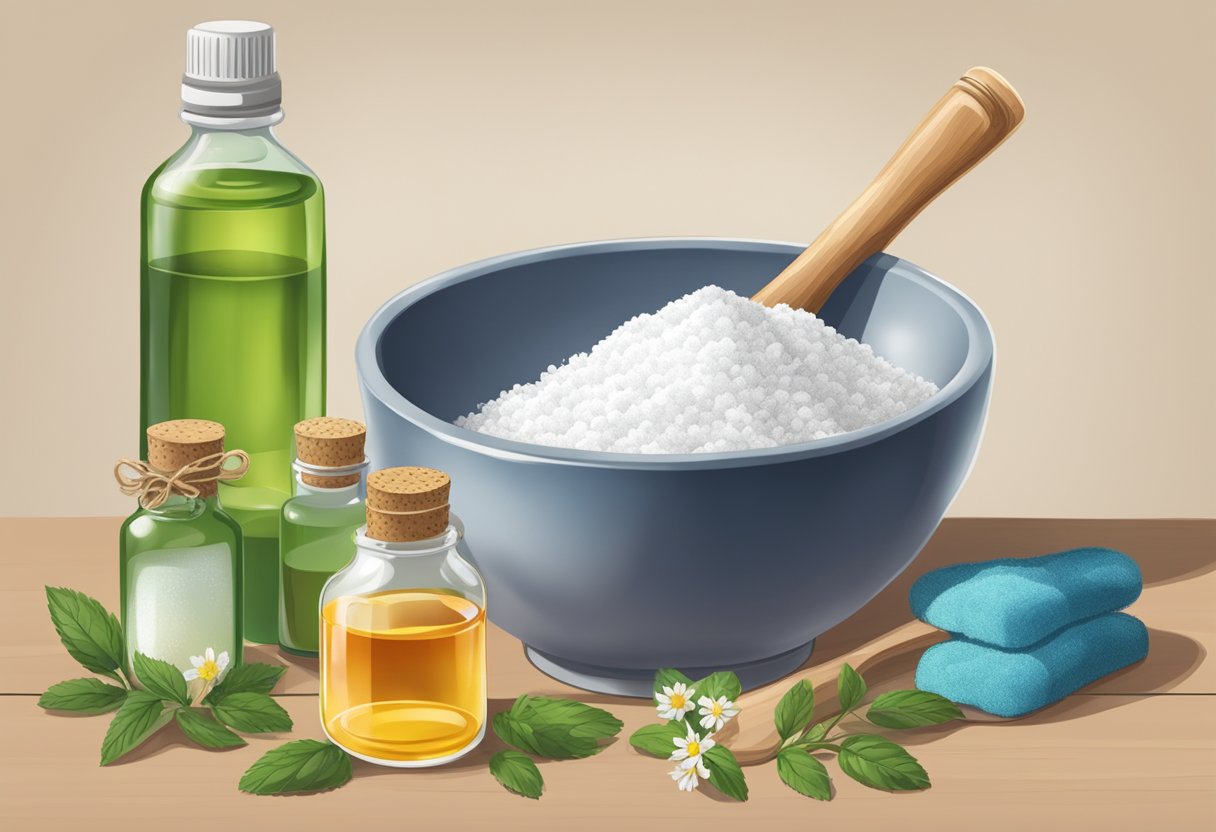Feet-Relief is supported by our audience. When you purchase through one of our links, we may earn a small affiliate commission. As an Amazon Associate I earn from qualifying purchases.Your cost is not affected.
Foot odor can be an embarrassing and often persistent issue that many people experience. Caused by bacteria thriving on the feet, unpleasant odors arise when sweat and bacteria combine, creating an environment that many would rather avoid. Addressing this problem doesn’t always require a trip to the store or a prescription. Instead, natural remedies for foot odor can offer effective solutions right from the comfort of your own home.
Utilizing items such as tea soaks, baking soda, and essential oils, individuals can combat foot odor by employing methods that are not only natural but also easily accessible.
Understanding the root causes of foot odor is essential in preventing it. This includes maintaining proper foot hygiene, choosing the right footwear, and considering diet’s impact on body odor.
While daily washing is crucial, integrating natural foot soaks and powders can directly address the bacteria and sweat. Being mindful of foot health and hygiene can lead to long-term relief from foot odor.
Key Takeaways
- Regular hygiene practices are fundamental in controlling foot odor.
- Natural remedies like tea soaks and essential oils can effectively eliminate bacteria on feet.
- Choosing proper footwear and paying attention to diet are important preventive measures.

Understanding Foot Odor
Video Credit: @DrTomBiernacki
Foot odor is a common concern that can be attributed to various factors. Your daily activities, hygiene habits, and choice of footwear all play a role in the development of foot odor.

Causes of Foot Odor
Foot odor typically originates from sweat and the interaction between your feet and shoes. When your feet sweat, the moisture becomes trapped in your socks and shoes, creating an ideal environment for bacteria to thrive. Factors contributing to excessive sweating include:
- Physical activity: Engaging in sports or intense exercise can increase foot perspiration.
- Hyperhidrosis: A medical condition characterized by excessive sweating not necessarily linked to heat or exercise.
- Stress: Emotional stress can trigger sweat production, including on your feet.
Bacteria and Sweat
The primary culprit behind foot odor is the bacteria on your skin. These microorganisms feed on sweat and dead skin cells, producing isovaleric acid, which gives off a characteristic unpleasant smell. Different bacteria play roles in foot odor:
- Staphylococcus hominus: Commonly associated with body odor.
- Corynebacteria: Contribute to the smell by breaking down sweat.
- Brevibacteria: Also known to cause strong odors, often compared to cheese.
Shoe Material Impact
The material of your shoes significantly affects foot odor. Breathable materials like leather and canvas allow air circulation, reducing moisture buildup.
In contrast, shoes made from synthetic materials tend to trap moisture and provide a breeding ground for bacteria. To minimize foot odor, consider these shoe material options:
- Natural fibers: They provide better ventilation for your feet.
- Moisture-wicking linings: These can help keep feet drier.
- Mesh panels: For enhanced airflow in athletic shoes.
Daily Hygiene Practices
Incorporating routine measures into your daily hygiene can significantly reduce foot odor. Focus on thorough cleansing, keeping your feet dry, and choosing appropriate socks.
Proper Foot Washing Techniques
Step 1: Use a soap that is effective against bacteria and wash your feet thoroughly to remove dirt and sweat contributing to odor.
Step 2: Scrub between your toes and the entire foot surface, ideally with a washcloth or brush, to remove all bacteria.
Importance of Dry Feet
After washing, pat your feet dry with a clean towel, especially between the toes. Dampness encourages bacterial growth, so it’s crucial your feet are completely dry.
Sock Selection Tips
- Material: Opt for socks made of materials like wool, bamboo, or special antibacterial fabrics that wick away moisture.
- Change Frequency: Change socks daily, or more often if you sweat excessively, to keep your feet fresh.

Natural Remedies Overview
In this section, you will learn about the advantages of using natural solutions for foot odor and how they compare with commercial products.
Benefits of Natural Solutions
Safety: Natural remedies often involve ingredients found in your home, such as baking soda or essential oils, which are gentle on your skin.
Cost-Effectiveness: Utilizing household items for foot odor can be more economical than purchasing specialized foot-care products.
Comparison with Commercial Products
Ingredients Transparency: With natural remedies, you know exactly what you’re applying to your feet, unlike some commercial products, which may contain a mix of chemicals.
Environmental Impact: Your choice of natural foot odor remedies can be more eco-friendly, as it reduces the need for packaging and manufactured chemicals.
Home-Made Solutions
Simple ingredients found in your home can be crafted into effective natural remedies when combating foot odor.
Tea-Based Foot Soaks
You can reduce foot odor by preparing a foot soak using tea. Boiling two tea bags in a pint of water, allowing them to steep, and then diluting with two quarts of water creates a mixture that you can use to soak your feet. A tea-based foot soak can be performed for 15 to 30 minutes each day to help eliminate odor.
Baking Soda Applications
Baking soda is known for its odor-absorbing properties. Sprinkle baking soda inside your shoes or socks, or apply a paste made of baking soda and water to your feet. As a natural deodorant, baking soda applications can help neutralize foot odor and absorb excess moisture.
Vinegar Soaks for Feet
Vinegar creates an acidic environment that can reduce bacteria on your feet. Mix one part vinegar with two parts water to create a soaking solution.
Immersing your feet in a vinegar soak for 20 minutes can assist in reducing odor-causing bacteria. Avoid using vinegar if you have open sores or wounds on your feet.
Essential Oils for Foot Odor
Video Credit: @wayofwill8034
Essential oils possess natural antibacterial properties, which can effectively combat the bacteria that cause foot odor. When used properly, they provide a safe and natural way to address unpleasant smells while also refreshing your skin.
Lavender Oil Use
Lavender oil is renowned for its calming scent and is also a powerful ally against foot odor. Its antibacterial properties help to eliminate the bacteria that contribute to unpleasant smells. Add a few drops to a foot bath, or make a homemade foot scrub with sugar and olive oil.
Tea Tree Oil Benefits
Tea Tree oil stands out as one of the most potent essential oils for fighting foot odor due to its strong antimicrobial properties. It is a go-to solution for killing bacteria and fungi. Mixing a few drops of tea tree oil with a carrier oil and applying it to your feet can help keep them fresh and clean.
Peppermint Oil for Refreshing Feet
Besides having a refreshing scent, Peppermint oil offers a cooling effect that revives tired feet.
Its antimicrobial properties can help neutralize foot odor and are an excellent addition to a DIY foot soak. Just a couple of drops of water can provide instant relief and a refreshing experience.
Dietary Considerations
Your diet plays a crucial role in managing foot odor. You can reduce unpleasant smells by understanding which foods to avoid and what dietary changes can help.
Hydration for Reducing Odor
Staying well-hydrated is essential for minimizing foot odor. Water helps flush toxins out of your body, reducing the buildup of bacteria on your skin.
Foods to Avoid
Certain foods can increase sweat production or lead to more pungent body odor. Consider limiting:
- Garlic and onions: These foods have strong scents that can be excreted through your pores.
- Spicy foods: Can cause your body to sweat more, leading to an increase in foot odor.
- Refined carbohydrates and sugary foods: May contribute to the growth of smell-producing bacteria.
Beneficial Dietary Changes
To combat foot odor, integrate foods that can naturally reduce perspiration and bacteria growth:
- Whole grains and leafy greens: Support overall digestion and may reduce sweat and body odor.
- Probiotics: Found in yogurt and fermented foods, these can balance the bacteria in your body.
- Zinc-rich foods: Shellfish, nuts, and seeds can potentially reduce foot odor.
Choosing the Right Footwear
The right footwear is crucial in managing foot odor. Selecting materials that allow your feet to breathe, shoes that fit properly, and rotating your shoes can significantly reduce the incidence of unpleasant smells.
Breathable Materials
Materials matter for the health of your feet. Shoes made from natural materials, like leather or canvas, allow for better air circulation around your feet, reducing the moisture buildup that leads to odor. When shopping, seek out shoes labeled as “breathable.”
Proper Fitting Shoes
Shoes that fit well are less likely to cause sweating, which can contribute to odor. Your shoes should have enough space to wiggle your toes but still provide support. If your shoes are too tight or loose, they can promote sweating and increase the risk of foot odor.
Alternating Shoes to Reduce Odor
Let your shoes breathe. Rotating between different pairs of shoes gives them time to air out and dry, preventing the proliferation of bacteria and fungi. Aim not to wear the same pair two days in a row, and consider using open shoes like sandals when possible.
Preventative Measures
Taking proactive steps can significantly reduce foot odor. These include keeping your feet dry, using products that target the causes of the smell, and ensuring your footwear remains clean.
Antifungal Powders
Antifungal powders can be a key line of defense against foot odor. By applying powders like baking soda, you create an environment that is inhospitable for the yeast and fungi that contribute to smelly feet.
Foot Deodorants
Incorporating foot deodorants into your daily routine can also help. These products often contain ingredients like lavender oil, which has a pleasant fragrance and possesses antibacterial properties to reduce odor.
Maintaining a Clean Shoe Environment
Lastly, maintaining a clean shoe environment is crucial. Alternating shoes to give them time to air out and using shoe sanitizers can minimize the presence of odor-causing bacteria. Regularly washing your footwear, when applicable, will also contribute to a fresher scent.
Wrapping It Up
Natural remedies can effectively tackle foot odor. Try using baking soda, vinegar, or essential oils. Keep your feet clean and dry.

Wear breathable shoes and change socks regularly. Remember, home remedies are simple yet powerful. Say goodbye to foot odor and enjoy fresh, comfortable feet!
Frequently Asked Questions
What natural remedies are effective for eliminating foot odor permanently?
Consistent foot hygiene paired with daily use of foot deodorizers such as soaking in black tea reduces sweating and eliminates bacteria that cause odor.
Which home remedies can prevent my feet from smelling in shoes?
Wear socks made from natural materials to absorb sweat, and consider sprinkling baking soda inside your shoes to neutralize odors. Applying foot powders or natural antiperspirants can also prevent odor.
What causes persistent foot odor even after proper hygiene?
Persistent foot odor can occur due to excessive sweating, providing an environment for bacteria to thrive. It might be a sign of hyperhidrosis or a fungal infection, requiring more targeted treatments.
What are quick, natural remedies for foot odor?
Applying rubbing alcohol to your feet can quickly dry them out and reduce odor. Using lemon juice or vinegar as a natural astringent can also be a fast-acting solution.
Can baking soda be used to treat foot odor, and how should it be applied?
Yes, baking soda can be used to Treat Foot Odor by absorbing moisture and neutralizing pH levels. Sprinkle it on your feet and in your shoes regularly to manage odor.
Are there any natural foot soaks that can detoxify and reduce foot odor?
Foot soaks with Epsom salts, apple cider vinegar, or baking soda can detoxify feet and reduce odor. A black tea soak can also be particularly effective due to the tannic acid present in the tea.
Amazon and the Amazon logo are trademarks of Amazon.com, Inc, or its affiliates.









